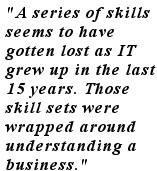The cloud, big data analytics and mobile computing are ushering in a new era for IT — an era where a realignment of IT skills will be necessary.
New job titles will begin to emerge — cloud specialist, cloud computer architect, cloud system engineer and cloud alliance manager, just to name a few. That said, many of the skills needed for those occupations can be found in many a worker’s IT toolbox, although they may have gathered a few cobwebs.
Reinvesting in IT soft skills

“A series of skill sets seems to have gotten lost as IT grew up in last 15 years,” said Jason Helmick, a senior technologist with Concentrated Technology, an IT education and consulting company. “Those skill sets were wrapped around understanding a business.”
“It’s OK to understand your product disciplines, but you have to understand how your business reacts and how you’re a part of that,” Helmick continued. “IT is part of a business, not just a department.”
That means an important part of the skill set for a future IT professional is understanding their role in a business beyond IT, and how their technology solutions will affect the business as a whole.
“We can’t wait six months to bring up a series of servers anymore,” Helmick said. “IT has to be like the power company. You flip a switch and you get servers.”
While traditional IT skills will continue to be important, the cloud, big data and mobility will require IT to exercise some skills that may have been gathering dust or need further honing. For instance, business and financial skills will be needed to sell IT-driven initiatives to company brass. Contract and negotiation skills will be important for getting the best deals for a company with a cloud provider.
Soft skills in the cloud
 In fact, because cloud deployments and big data projects require cooperation between IT, business units and third parties, IT will need to align itself more closely with an organization’s business. For better or for worse, no longer is IT going to be the sole arbiter of its services. It will need to shape the consumption of those services with the managers of the business.
In fact, because cloud deployments and big data projects require cooperation between IT, business units and third parties, IT will need to align itself more closely with an organization’s business. For better or for worse, no longer is IT going to be the sole arbiter of its services. It will need to shape the consumption of those services with the managers of the business.
Moreover, in addition to its traditional role of maintaining existing infrastructure and operations, IT will need to take on the role of broker, intermediary and orchestrator of cloud services for the business across all cloud deployments, whether they be public, private or hybrid clouds.
“They’ll need to communicate better with the business people,” said Steve Philp, marketing director for the The Open Group. “They’ll need to upscale their communication skills.”
That means all kinds of communication skills. “They have to be able to network, not only face to face, but through social media, too,” Philp said. “IT is still about the technical, but it’s not just about the technical anymore.”
“The soft skills, in many cases, are even outweighing the tech skills,” said John Reed, senior executive director for Robert Half Technology. “That’s a little bit counter-intuitive, but we’re definitely seeing that trend.”
The combination of soft and business skills can be seen in the requirements for some cloud positions. “In the cloud arena, companies are looking for someone who can help them architect their cloud computing strategy,” Reed said. “What does it look like? How do we build it out? What’s the endgame that we’re shooting for?”
“They’re also looking for people with business system analysis experience who can look at applications and determine if they’re good candidates to move to the cloud,” he added.
Big data essentials: math, science, statistics
In the big data realm, Reed explained, companies are looking for candidates with strong backgrounds in science, mathematics, analytics and statistics. “They’re looking for highly analytic disciplines that, many times, will fall outside IT,” he said. “They know if you’re good at those things, it will be fairly easy to make the transition to big data on the IT side.”
Waves in tech advances typically create demand for manpower with skill sets in short supply, and that’s the case with the cloud, big data and mobile. To address the problem, companies are thinking laterally.
“Supply is very, very low compared to the demand,” Reed said. “There just aren’t a lot of technology professionals in these disciplines. So what organizations have begun to look for are translatable skills that they can take and build on to develop their own experts.”
Skills for staying on top of mobile
Meeting the demand for mobile technologists is a little easier. “A lot of the traditional roles that you find in IT can be used in mobile systems and mobile support,” Reed said.
“Mobile has been a strong area of demand over the last couple of years, and it certainly is not slowing down,” he added.
Despite the need for some new skills, old skills will still be needed in the new IT world. “There are a lot of skills which people in IT have that are still needed,” said Anjul Bhambhri, big data vice president at IBM. “The concepts for leveraging data are still similar so people with that kind of background are making headway into leveraging these new technologies.”
Since open source communities play important roles in cloud computing and big data processing, familiarity with that form of software development will grow in importance. “Open source is key for big data, but you don’t need deep skills there,” Bhambhri said.
IT as big data consumers
That’s especially true for IT pros who will be consumers of big data rather than operators of big data deployments. “Consumers have to understand what they can do with open source,” Bhambhri explained, “but it’s not like they have to build all the pieces of the open source.”
What those IT consumers of big data will need, however, is more knowledge of the roles of other consumers of big data, because those other consumers will have the expertise needed for the success of big data projects. For example, if risk models were being developed, someone with expertise in what increases or reduces risk would be needed.
Tying IT into the bigger picture
In response to the continued expansion of technologies like cloud computing, big data and mobile, skills in areas like business, communications and management should be considered as part of a larger whole.
“You can’t focus on a product or a language,” said Helmick, of Concentrated Technology. “You need to focus on an entire system.”
“It’s quite a bit of training,” he added. “If you don’t like learning, IT is not the career for you.”
Sources
Interview with Anjul Bhambhri, Vice President, Big Data and Streams, IBM; interview conducted by John Mello, July 2014
Interview with Jason Helmick, Senior Technologist and Business Development Manager, Concentrated Technology; interview conducted by John Mello, July 2014
Interview with Steve Philp, Marketing Director, The Open Group; interview conducted by John Mello, July 2014
Interview with John Reed, Senior Executive Director, Robert Half Technology; interview conducted by John Mello, July 2014
